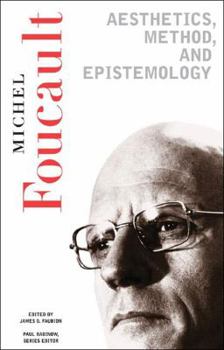Aesthetics, Method, and Epistemology
(Book #2 in the Essential Works of Foucault (1954-1984) Series)
Select Format
Select Condition 
Book Overview
Few philosophers have had as strong an influence on the twentieth century as Michel Foucault. His work has affected the teaching of any number of disciplines and remains, twenty years after his death, critically important. This newly available edition is drawn from the complete collection of all of Foucault's courses, articles, and interviews, and brings his most important work to a new generation of readers. Aesthetics, Method and Epistemology (edited by James D. Faubion) surveys Foucault's diverse but sustained address of the historical forms and interplay of passion, experience, and truth.
Format:Paperback
Language:English
ISBN:1565845587
ISBN13:9781565845589
Release Date:September 1999
Publisher:New Press
Length:528 Pages
Weight:2.00 lbs.
Dimensions:0.9" x 5.9" x 9.5"
Customer Reviews
2 ratings
For nerds and for new comers
Published by Thriftbooks.com User , 25 years ago
It is not so easy to determine where Foucault is attempting to go with his published books. In this sense, the books from "Madness and Civilization" to the 3rd "History of Sexuality" can be thought of as practical works that have specific institutional and discursive aims. Thus, they are short in explanation of the methodology and instead such intentions are available as they are practiced in the texts. For example, philosophers such as Nietzsche and Marx, to name a few, are hardly mentioned in Foucault's book; however, they are often evoked and utilised without obvious references or footnotes. As Deleuze once commented: Foucault doesn't say what to do, he just does it. Thus, Foucault's occasional essays, covering academic journals, popular press, lectures, introductions, and so on, serve to clue us, the readers, as to where Foucault is coming from, and, furthermore, in which direction his thought is heading. This edition, covering Foucault's superb writings on literature, his mentors, music, as well as other philosophical movements, situates a thinker within an intellectual context from his very own words. In "The Archaeology of Knowledge" Foucault begins by saying "do not ask me who I am..." To be sure, with this volume, we can begin to better understand Foucault without the interface of commentators and scholars. Directness of discourse is an important element in Foucault's thought...Although much of the pieces that appear here have been previously translated and released in a variety of formats, I predict that any scholar or occasional reader would be pleased to accept this redundancy for the very convenience that this collection presents.Some most interesting pieces include, the previously hard to find Foucault's response to Derrida's reading of "Madness and Civilization"; Foucault's responses to the Epistemology circle; and an illuminating interview in which Foucault situates his thought in 20th Century French intellectual life. In addition, this collection includes popular 'staple' such as "Theatrum Philosophicum," "Nietzsche, Freud, Marx," and "Nietzsche, Genealogy, History," all of which provide endless insight into Foucault even despite numerous re-readings. While serious followers of Foucault's works would benefit greatly from this collection, this would also serve as a good introduction to Foucault--maybe second only to the cartoon books on Foucault! And to close: if Nietzsche was the greatest philosophical stylist, this collection demonstrates conclusively that Foucault was a close second...
?
Published by Thriftbooks.com User , 25 years ago
Michel Foucault , i think should be read by anyone read and liked Nietzsche.






